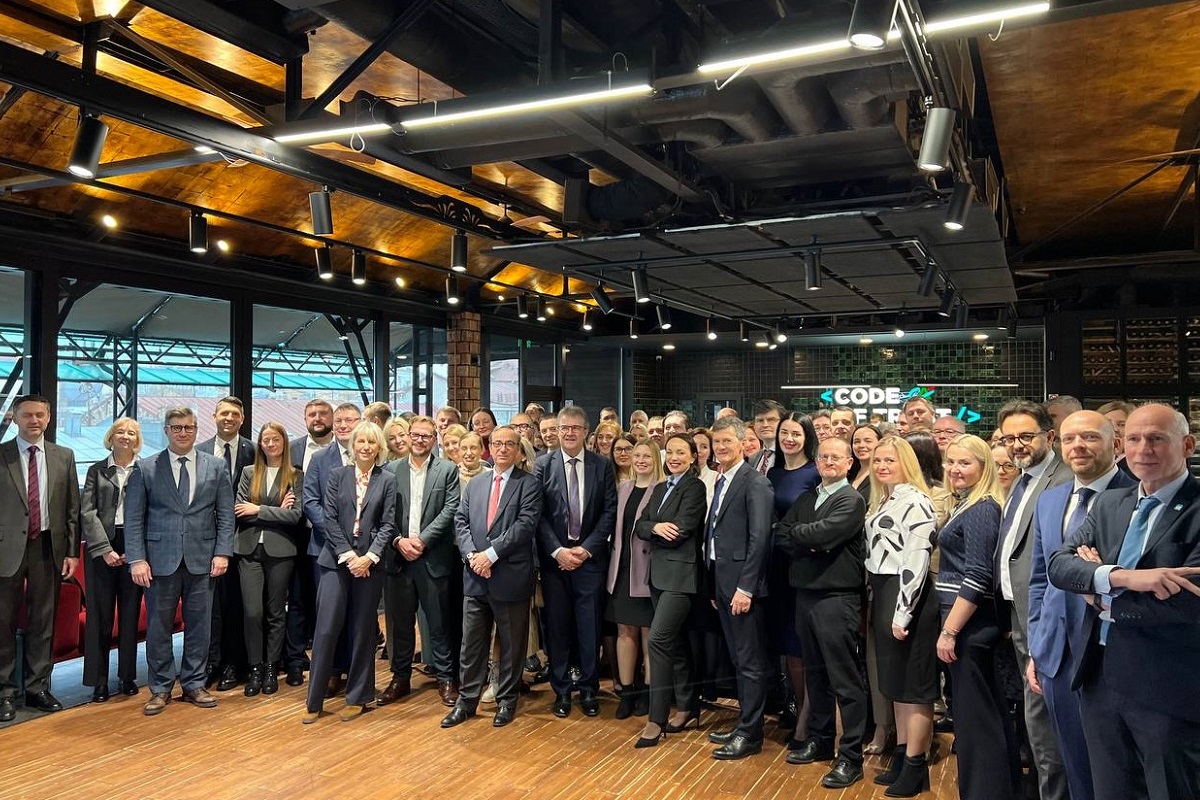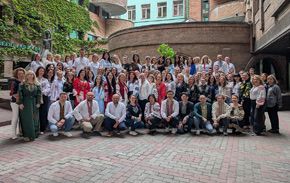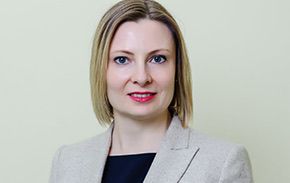"Top 100. Ratings of the largest" Magazine. No. 17 December 2024
Now it's a crucial time for Ukraine and obviously a crucial time for Credit Agricole Group. Can you tell us what key principles have guided your management and leadership during this crisis, and how these principles shape the Bank's new strategy, AIR 2028?
As you said, there are many challenges for Ukraine and the banking system, however, the strong sense of solidarity with our customers and society helps us to overcome them.
We strive to encourage this solidarity among colleagues by fostering cooperation between business lines in the bank and to maintain personal contact with our customers, that helps us better understand challenges they face, and support them. The human responsibility and solidarity are at the heart of Credit Agricole’s model and one of the pillars of our new strategy AIR: Aim is to Invest in Recovery. We defined key directions for the bank, emphasizing our commitment to investing in Ukraine and supporting the country’s recovery.
Another crucial aspect of our strategy is sustainable development. For example, last year, when Ukraine faced severe electricity shortages due to widespread destruction, we decided to participate in the project that helps Ukraine to build its energy independence. In 2024 our market share in energy project financing was 10%. We made a strong effort to finance the country's urgent energy needs.
I’ve heard that the CEO of the Group recently visited Ukraine. Can you share the key messages he conveyed about the Group’s long-term commitment to Ukraine? Should we expect new investments, initiatives, or strategic partnerships in the nearest future?
This is the third time CEO of Credit Agricole S. A. visited Ukraine in the wartime. This time, he delivered a strong message: despite the low predictability in the short term, due to the current situation, the Group has the long-term vision on presence in Ukraine. Clearly, Ukraine is the part of Credit Agricole Group European strategy. This is manifested in concrete actions. For example, since 2022 Credit Agricole Ukraine has accumulated positive net results which have been kept locally, building up a basis to support the country when come the time of reconstruction.

CEO of Credit Agricole S. A. Philippe Brassac visited Kyiv in early 2025
Our overall vision is clear – we are committed to investing in recovery, developing the bank, and leveraging all available tools to achieve these goals.
Since the start of the war, Credit Agricole has paid more than UAH 8 billion in taxes and fees in Ukraine. In your opinion, what role does the banking sector play in Ukraine’s economic recovery, and how do you balance profitability with national support?
First, yes, we have paid a significant amount of taxes and fees. It is our contribution to the country's defense and recovery, and our employees take pride in that. Since we pay 50% in taxes, it means they spend half their working time contributing to national defense.
In terms of the banking system, now it is strong and profitable, which means it has the capacity to support recovery. However, the Ukrainian banking system alone is not sufficient for large-scale reconstruction. The scale of the reconstruction effort is huge, thus the banking sector will need external support to finance such major projects.
That is why we also have started to building risks sharing partnerships with international financial institutions such as the EBRD and IFC and we want to continue to develop them. We have already begun building partnerships with both institutions and have signed agreements totaled around €240 million to finance the Ukrainian economy. They have been providing valuable support and these kinds of risks sharing partnerships enhance the capacity of the bank to give out loans to a greater number of Ukrainian companies, which is crucial for reconstruction.
When we talk about reconstruction, it extends beyond construction. For instance, there are significant opportunities in the energy sector, as well as in agro-industry and food production. Ukraine has great potential to develop add value to its agricultural sector and enhance the overall value of its products.
My next question concerns the agribusiness in Ukraine, which has faced severe challenges. How has this changed your bank's approach to financing this sector, and what new trends are shaping its future?
The situation was quite complex at the beginning of the war, when the access to Black Sea was blocked. This created significant difficulties for Ukraine's agribusiness. However, for more than a year now, the Black Sea corridor has been open, which allowed resuming exports. Moreover, grain prices are at a favorable level, putting farmers in a quite good position. We are already seeing them invest in new equipment, which is a positive sign of recovery.
It is extremely important, since agriculture accounts for 50% of our corporate loan portfolio, making it a crucial sector for us. Two years in a row Credit Agricole was recognized as the best bank for agribusiness according to the "TOP-100: Ratings of the largest". Looking ahead, we have three key priorities. First, we aim to support the financing of value-added products in the food industry. Some agricultural holdings have already begun investing in this area, and we will continue to encourage this trend.
Second, we are focused on promoting sustainable agriculture. We want to help farmers reduce their carbon footprint, and we are developing partnerships with Ukrainian companies to support investments in low-carbon and zero-carbon farming practices. In order to do this, at the beginning of 2025, Credit Agricole joined efforts with leading companies from various realms to roll out the ACA program (Agriculture Climate Adaptation Program).
Third, we plan to expand our customer portfolio and include more small farmers, as well as promote family farming. Small farms have faced significant challenges during the war, and while the situation is improving, we want to ensure they receive the support they need. This segment plays a vital role in Ukraine’s agricultural sector.
Credit Agricole provides services for more than 2500 agribusiness customers. About 80% of agrarian customers stay with us for more than 5 years. This is the highest indicator of loyalty and trust.

Credit Agricole is the best bank for agribusiness as ranked by Delo.ua and “TOP-100: Ratings of the Biggest” magazine.
Credit Agricole collaborates extensively with the EBRD and IFC. In terms of the importance of new investment in Ukraine, what are the main challenges in attracting international investors, and how do you see this will evolve in the coming years?
First, these institutions are willing to invest in Ukraine, since Ukraine is clearly within strategic directions for organizations like the IFC and EBRD. They are backed by European states, which allows them to make a substantial impact.
For us, the goal is to collaborate with them to support businesses, particularly mid-sized and small companies, as they cannot be reached directly due to a lack of networks. We can bridge that gap and provide the necessary support to this part of the economy.
Another challenge we are addressing, in collaboration with the Embassy of France, is attracting foreign investment and private capital to Ukraine. Many companies are hesitant, waiting for better clarity about the situation. While some businesses have started entering the market, we have yet to see a major wave of investment.
One notable example is a French company that made a significant investment in the telecom sector through the acquisition of Lifecell and Data Group. While this is a major case, such large-scale initiatives remain rare. However, building momentum is key.
Those who visit Ukraine often recognize the many opportunities available, but the first and most important challenge is attracting them to enter the market. That is why I am currently in France and actively communicate with French companies to encourage them to explore the Ukrainian market. I highlight the positive economic trends and the potential partnerships they can establish. Now is the time to act − before the window of opportunity is closed.
Recently, the bank has launched online onboarding for private entrepreneurs and private individuals. How does this reflect the bank's broader digital strategy?
In Ukraine, digital innovation is essential. Digital solutions are deeply ingrained in the country's business environment, which is why we continue investing heavily in this area.
You mentioned online onboarding, which significantly simplifies the customer journey. Private individuals from any place in the world can become a Credit Agricole customer in a matter of minutes and enjoy all the benefits of simple and reliable daily banking. In fact, we are ahead of some other Europeans countries, where this feature is not yet available. Our digital development is highly dynamic, with new features introduced every two weeks. For example, we plan to launch online credit card services in the 1st half of 2025.
All our digital solutions are developed in-house rather than outsourced, ensuring full control over innovation. Online onboarding is particularly important for customer acquisition, and the initial results have been encouraging.
Despite our focus on digital, human interaction remains crucial for us. Our customers may rely not solely on digital tools. Every customer has access to a bank manager who can assist them whenever needed, even on weekends. Many customers value having a dedicated contact person at their outlet who can quickly resolve any issues.
Our approach balances both human interaction and digital solutions, ensuring the best possible experience for our customers.
Credit Agricole traditionally maintains leading position in automotive lending market in Ukraine. What do you think is a driver for the market development, and how does your bank assess the financial health of Ukrainian customers as of today?
The amount of our customers' savings has doubled since the beginning of the war. This was unexpected, but several factors contribute to it. One key reason is the consistent increase in salaries year after year, leading to higher disposable income. Many working individuals are managing to save while also spending in specific sectors, and car industry is one of them.
While car sales haven’t yet returned to pre-war levels, demand remains strong. Our car lending results increased by 50% last year, outpacing the market. Our market share now is about 30%, indicating a clear appetite for both saving and consumption.
Beyond financial contributions, how exactly is Credit Agricole Ukraine engaged in rebuilding communities, supporting social resilience, and what are your plans for the future in terms of Ukraine’s reconstruction?
The war has reinforced the importance of supporting humanitarian and social projects, and we see this as a vital part of our mission. It also resonates deeply with our employees, many of whom are personally involved in supporting various communities.
Since the start of the war, we have allocated EUR 150 million to charity within We Care! program, primarily to the purchase of hospital equipment and other urgent needs. There is still so much to be done in Ukraine, and while our involvement in social initiatives predates the war, we have significantly expanded our efforts since the full-scale invasion.
This commitment has become part of our DNA, and we will continue supporting Ukraine’s recovery. It is not just about corporate responsibility − it is also a source of motivation for our team, who take pride in contributing to the country's recovery.

 Useful information
Useful information
 Useful information
Useful information
 Useful information
Useful information
 Useful information
Useful information
 Useful information
Useful information
 Useful information
Useful information
 Useful information
Useful information
 Useful information
Useful information
 Useful information
Useful information
 Useful information
Useful information
 Useful information
Useful information
 Useful information
Useful information
 Useful information
Useful information
 Useful information
Useful information
 Useful information
Useful information








